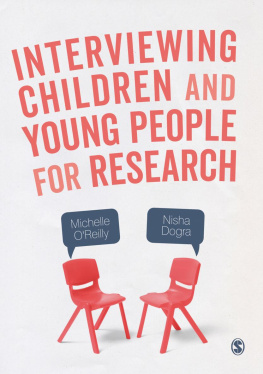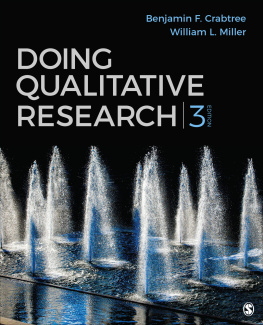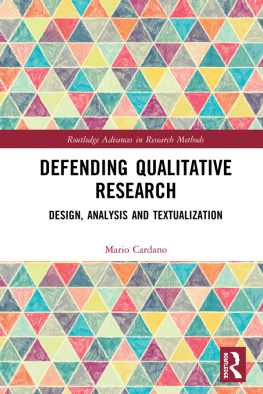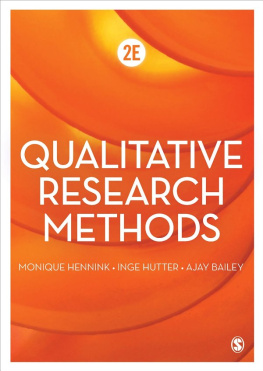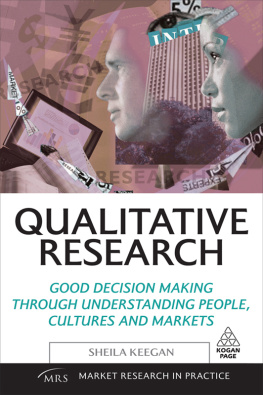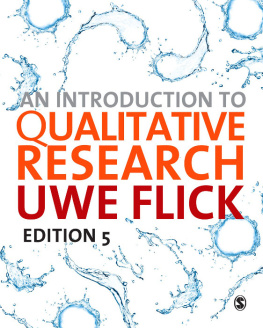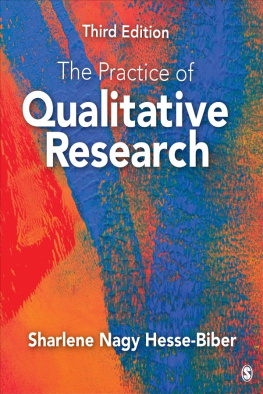SAGE Publications Ltd
1 Olivers Yard
55 City Road
London EC1Y 1SP
SAGE Publications Inc.
2455 Teller Road
Thousand Oaks, California 91320
SAGE Publications India Pvt Ltd
B 1/I 1 Mohan Cooperative Industrial Area
Mathura Road
New Delhi 110 044
SAGE Publications Asia-Pacific Pte Ltd
3 Church Street
#10-04 Samsung Hub
Singapore 049483
Michelle OReilly and Nikki Kiyimba 2015
First published 2015
Apart from any fair dealing for the purposes of research or private study, or criticism or review, as permitted under the Copyright, Designs and Patents Act, 1988, this publication may be reproduced, stored or transmitted in any form, or by any means, only with the prior permission in writing of the publishers, or in the case of reprographic reproduction, in accordance with the terms of licences issued by the Copyright Licensing Agency. Enquiries concerning reproduction outside those terms should be sent to the publishers.
Library of Congress Control Number: 2014953949
British Library Cataloguing in Publication data
A catalogue record for this book is available from the British Library
ISBN 978-1-4462-7342-5
ISBN 978-1-4462-7343-2 (pbk)
Editor: Jai Seaman
Assistant editor: Lily Mehrbod
Production editor: Ian Antcliff
Marketing manager: Sally Ransom
Cover design: Jennifer Crisp
Typeset by: C&M Digitals (P) Ltd, Chennai, India
Printed and bound by CPI Group (UK) Ltd, Croydon, CR0 4YY
Preface
In recent times there has been a growth in the popularity, use and acceptance of qualitative methods in health, education, social sciences and other areas. This has been reflected in the increases in funding assigned to qualitative projects (or those with a qualitative component), a growth in qualitative publications (including the creation of journals devoted to qualitative research), and the inclusion of qualitative methods in educational curricula. Undergraduate courses have given wider recognition to the value of qualitative research, with some accrediting bodies now requiring its inclusion for course accreditation. Clearly, dissemination practices and debates have contributed to the acceptance of qualitative research, and growth in the production of qualitative textbooks has been instrumental in this. These textbooks have been an invaluable resource for novice researchers, academics and students in developing their skills and understanding the approach.
More recently, however, authors have started to move away from debating the value of qualitative research and justifying its necessity, to exploring broader methodological issues in producing high-quality qualitative work. Some of the debates emerging in the contemporary literature are those of quality criteria (see Spencer et al., 2003; Tracy, 2010), including the application of saturation for sampling adequacy (Guest et al., 2006; OReilly and Parker, 2013), mixing qualitative methods (Barbour, 1998; Morse, 2009), use of researcher-generated versus naturally occurring data (Potter, 2002; Speer, 2002), consequences of advances of technology for recording (Heath et al., 2010; OReilly et al., 2011), and the specific ethical issues that qualitative research invokes (Giordano et al., 2007; Morse, 2001; OReilly et al., 2011). As researchers and students become more exposed to and practised in qualitative research methods, it is essential to be well informed of the more advanced theoretical issues and debates that this kind of work evokes, and as yet there has been no single resource that draws these together.
This book, which has both a theoretical and applied focus, will be a valuable resource for all researchers, academics and students undertaking qualitative research. This timely work is important for enabling good research practice, and moves on from foundational texts by building on this knowledge. Interest in addressing the more complex issues embedded in the qualitative approach has only recently gained momentum as researchers and academics encounter them in their research practice. These issues are gradually being raised in the literature through conference presentations and journal articles, and therefore this book seeks to synthesise these debates and provide some practical guidance on how to manage them in research reality. Each chapter has been designed to enable readers to progress in their thinking and practice, through an exploration of the key theoretical issues and debates pertinent to quality in qualitative research.
Aims of the Book
This book is not designed to give practical advice on how to conduct a particular method of qualitative inquiry, as there are many good general practical texts on qualitative research methods. Rather this book aims to help with the decision-making process and provides an overview of theoretical debates and contentions within the qualitative field.
The aim of this book is to illuminate the advanced qualitative theoretical debates that have emerged and to provide an accessible overview which will facilitate broader engagement from a wide range of audiences. Its emphasis is on explicating the theoretical aspects of the main issues in an accessible manner which is complemented by a practical focus to facilitate application. Researchers may find the task of assimilating evidence from a range of disciplines and sources complicated, particularly given the complexity of theory related to many of the issues, and therefore this book aims to amalgamate this into one accessible resource to provide a platform for understanding.
The Intended Audience
We anticipate that this book will appeal to academics, researchers and students from a range of different disciplines because the issues covered are generic to all qualitative researchers, regardless of their training and background. We expect the book to be relevant to sociology, psychology, anthropology, health, social work, education, counselling, criminology, social policy, business and management, political science, law, childhood studies, human sciences, human geography and economics. We believe it will offer an important contribution as a resource for academics, researchers, postgraduate students, the voluntary sector, and practising professionals from these disciplines, and will be an essential book for anyone engaging in qualitative work, or interested in the debates more generally.








